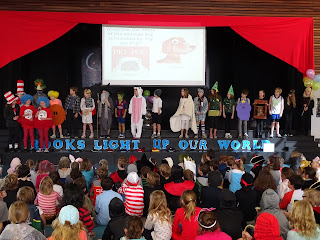Wednesday, 16 September 2015
Noongar Storytelling - A special visitor!
Tuesday, 8 September 2015
Book Week & Indigenous Literacy Foundation Success!
We also had a special musical performance from the OLC staff encouraging students to read - with some very funky dance moves included! This magic will be uploaded soon! Stay tuned!
Our Great Book Swap raised over $630 for the Indigenous Literacy Foundation! Great job! We will tweak the procedure next year to ensure that all students walk away with a new book to love. There were no books left over at the end of the day, so most children went home with something new to read. Thank you for the generous support of this fundraiser.
Below are some magic photos of the day. Thanks for your support everyone!
Yours in Reading,
Mrs. Amie Meyer and Mrs. Mary-Lee Kemp
Tuesday, 25 August 2015
BOOK WEEK IS NEARLY HERE!
Andy Griffiths on the Great Book Swap
Looking forward to an exciting week!
Mrs. Amie Meyer
OLC Library
Thursday, 6 August 2015
Childrens' Book Week 2015
Sunday, 7 June 2015
Helping Students to Understand What They Read.
Character Analysis
Saturday, 16 May 2015
Book Fair Success - Thank You!
Tuesday, 5 May 2015
SCHOLASTIC BOOK FAIR IS NEXT WEEK!
During library lessons next week, students will have an opportunity to browse and make purchases if parents feel their child is capable of doing so independently. Students may bring up to $10 to their lesson. A written parental acknowledgement must accompany students who wish to bring more than this amount to their lesson.
Each year group is invited to participate in a Book Fair Competition for their year level. Interested students have been given the competitions at this week's library lesson, however extra copies can be collected from the library if they happen to go astray. Entries are due next Monday the 11th of May. There will be one prize winner from each class who will win a Scholastic Reading Pack. Please leave entries in the allocated box inside the library door and make sure entries are clearly labelled with your child's NAME and CLASS.
Supporting the OLC Book Fair benefits all the students in our school, as we receive a minimum commission of 30% of the total sales to buy new books for the library. So come on down and see some of the great titles we have for sale and encourage your child's interest in reading. We look forward to seeing you next week!
Amie Meyer & Mary-Lee Kemp
Wednesday, 29 April 2015
Read and Win! It's easy!
- Ask your child to record the number of minutes they spend reading on each day in May.
- In the first week of June, students and their families enter their total Reading Minutes online for a chance to WIN!
Tuesday, 31 March 2015
Rocking out in the OLC library!
In library our Junior students have been learning the very important differences between fiction and non-fiction books. We have learned a fun rap to help us to remember the difference between the two. Take a look at the video - ask your children to join in and sing along! Click this link:
https://docs.google.com/file/d/0B2ie6dJegVNEdGx1c1RaS2drUzQ/edit
Mrs Meyer
Global Project: Week 2 Activity
Monday, 30 March 2015
We're online!
Tuesday, 3 March 2015
Let's Get Global!
Tuesday, 24 February 2015
Why do we visit the library?
The Australian Curriculm
The Australian Curriculum: English Foundation to Year 10 is organised into three interrelated strands that support students' growing understanding and use of Standard Australian English. Together the three strands focus on developing students’ knowledge, understanding and skills in listening, reading, viewing, speaking and writing. The three strands are:
Language: knowing about the English language
Literature: understanding, appreciating, responding to, analysing and creating
Literacy: expanding the repertoire of English usage.
The role of the OLC library.
The focus during OLC class library lessons is to develop the areas of literature and literacy. Library lessons are structured to allow students to:
Respond to literature.
Interact with others Examine literature Interpret, analyse and evaluate Texts provide the means for communication. They can be written, spoken or multimodal, and in print or digital/online forms. Multimodal texts combine language with other means of communication such as visual images, soundtrack or spoken word, as in film or computer presentation media.
The term ‘literature’ refers to past and present texts across a range of cultural contexts that are valued for their form and style and are recognised as having enduring or artistic value. Texts are seen as having personal, social, cultural and aesthetic value and potential for enriching students’ scope of experience.
Thursday, 19 February 2015
Diana Rigg PD
The ability to read and write is the hallmark of any literacy program. With respect to PLD Learning Resources, literacy is the 3rd dimension involved in achieving this goal.
Summary
Sunday, 8 February 2015
Books that reflect our school values....
The novel centres around the main character August (Auggie), a ten-year-old boy with severe facial abnormalities. Little kids scream when they see him. Older kids make fun of him and call him a freak.







































